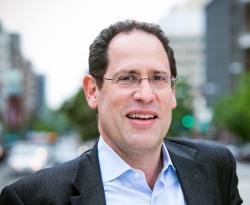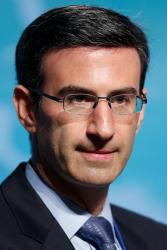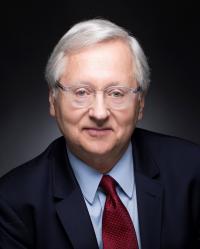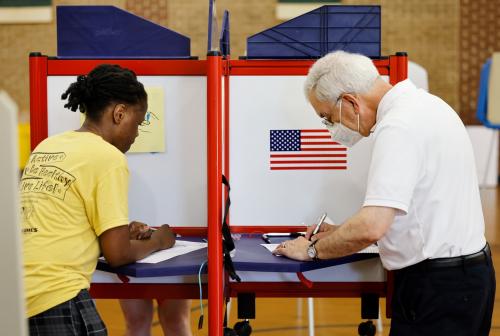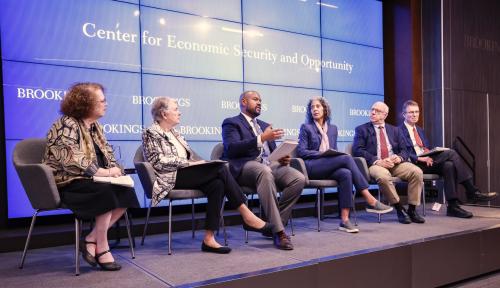President George W. Bush played for high-stakes in the 2002 midterm elections and won. Despite the abysmal record of previous presidents who campaigned aggressively to try to reverse the traditional pattern in midterm elections—the party in the White House almost always loses seats—Bush risked his post-September 11 popularity and political standing to return the Senate to Republican control and increase his party’s narrow House majority. He countered a sluggish economy and a sour public mood by focusing the campaign agenda on the threat from Iraq and the politics of homeland security. He traveled extensively during the last weeks of the campaign to mobilize party loyalists in targeted Senate and House races.
President Bush shaped the outcome of the 2002 elections, and now his decisions on foreign and domestic policy will determine what Congress does and how, if at all, policy will be affected.
POLICY BRIEF #115
Republican gains were, in fact, modest. The president’s party picked up two seats in the Senate and six in the House; a small number of votes made the difference between victory and defeat. A near-record number of incumbents returned to office, suggesting that the electorate was not in the mood for change. Nonetheless, Bush’s victory was substantial, and amounted to the political ratification the president had not won in securing the White House in 2000.
But Republican post-election euphoria was quickly tempered. In a December runoff, Sen. Mary Landrieu (D-La.) won reelection by emphasizing her independence and criticizing the White House on local issues, notably the protection of domestic sugar interests. Senate Republican leader Trent Lott of Mississippi lost his leadership position after remarks at a celebration for retiring Senator Strom Thurmond (R-S.C.) that seemed to endorse Thurmond’s segregationist past. The speed with which the White House orchestrated Lott’s replacement as majority leader by Tennessee Republican Bill Frist underscored the political difficulties the race issue still poses a president who received fewer than one in ten votes among African-Americans. The administration’s vulnerability on the economy was underscored by the replacement of two key members of his economic team, and the revelation that North Korea had moved to revive its capacity to build nuclear weapons raised questions about Bush’s focus on Iraq and the competence of the administration’s divided foreign policy team.
108th CongressHOUSE SENATE House Speaker: House Majority Leader: House Minority Leader: Senate Majority Leader: Senate Minority Leader: |
These post-election setbacks did not much affect the president’s domestic and foreign policy agenda. His moves were seen, depending on the observer, as either bold and courageous, or brazen and reckless. Bush renominated controversial judicial appointees; proposed another large package of tax cuts, including the elimination of taxes on dividends; rejected calls for revenue sharing with fiscally-distressed states; challenged the University of Michigan affirmative action program before the Supreme Court; insisted on a lower domestic spending cap for the 2003 fiscal year in a confrontation with the Senate; approved a plan to deploy an initial phase of a national missile defense system; and accelerated the buildup of military forces in the Persian Gulf. Much more will soon follow from the White House, including tort reform, ambitious plans to restructure federal health and retirement programs with a larger role for the private sector, and, of course, a resolution of the confrontation with Saddam Hussein.
The president’s agenda seems guaranteed to generate vehement opposition from Democrats. He is likely to have good luck in pushing his agenda through the House, where the Republican leadership holds a tight rein on its members and has the parliamentary means to prevail with a slender majority. His prospects are much less certain in the Senate, where moderate Democrats and Republicans may be less amenable to Bush’s ideas, especially on taxes, than they were in 2001.
The president’s extraordinary post-September 11 approval ratings have dropped since the midterm elections. The economy seems mired in a jobless recovery. The efficacy of the president’s economic stimulus package, as a stimulus, was questioned even by conservatives who supported its provisions. And the program’s size and tilt toward the higher-income taxpayers prompted even Republican senators to question its logic. Electoral defeat only sharpened Democratic opposition and unified rather than divided Senate Democrats, who need only forty-one votes to frustrate most administration initiatives.
Bush’s boldness could make him the most effective party builder since President William McKinley and an even more effective ideological leader than Ronald Reagan. His willingness to gamble is the defining characteristic of his presidency. Moreover, by laying out such a conservative domestic program, Bush could move the political center to the right and force his opponents to define compromise as something far less reasonable than they would have thought a few months ago.
But the president’s boldness in foreign policy risks the very kind of unintended consequences that conservative thinkers have warned against for a generation, and his domestic program risks opening Bush’s already established image to the charge that he is an unabashed sympathizer with the interests of the wealthy.
Foreign Policy
James M. Lindsay
Despite the fact that the United States faces immediate and dramatic challenges abroad, foreign policy was not at the forefront of congressional races during the 2002 mid-term elections. But it will probably feature prominently in the public debate in 2003.
Iraq tops the likely list of foreign policy issues. Congress voted in October 2002 to authorize the use of military force to oust Saddam Hussein. So lawmakers will be on the sidelines as President Bush decides whether to go to war. Should that happen, congressional debate on what the United States should do to shape a post-Hussein Iraq could be lively. Many members favor a sustained American military presence with the aim of helping to create a democratic Iraq. Many others, skeptical of nation-building, want an expeditious withdrawal of U.S. troops once the war ends.
North Korea’s nuclear weapons program is another potentially contentious topic. Despite elevating preemption to a central role in U.S. strategy, the Bush administration has for now ruled out military action on the Korean Peninsula. The White House is moving grudgingly toward talks with the North Koreans. Any deal Washington and Pyongyang strike to resolve the crisis could require Congress to approve aid. This would likely provoke opposition from lawmakers who argue that such deals constitute appeasement.
Congress will also take up President Bush’s proposal to create a Millennium Challenge Account to provide aid to developing countries that are pursuing sound economic and governance policies. While politically appealing on its face, the proposal raises numerous practical difficulties, not the least being how to ensure Congress can adequately oversee the program and how it affects other foreign aid programs.
Committees
The results of the 2002 mid-term elections mean that Republicans will now chair Senate committees. Despite the partisan switch, however, the ideological balance on the committees that handle defense and foreign policy will move only slightly. The chairmanship of the Senate Armed Services Committee has moved from Carl Levin (D-Mich.) to John Warner (R-Va.). Over the years, Armed Services has largely pursued a bipartisan approach to legislating. And in the wake of September 11, Democrats and Republicans on both sides of Capitol Hill have found little to quarrel about in the defense budget.
At the Foreign Relations Committee, Joseph R. Biden Jr. (D-Del.) has passed the gavel to Richard Lugar (R-Ind.). Lugar is a moderate internationalist whose approach to foreign policy resembles Biden’s in many ways and departs sharply with the unilateralism that other Senate Republicans favor. Lugar has a reputation for being independent minded. When he served as chair of Foreign Relations in the mid-1980s, he at times found himself publicly at odds with Ronald Reagan on foreign policy.
The Intelligence Committee chairmanship moves from Bob Graham (D-Fla.) to Pat Roberts (R-Kan.). Roberts hopes to encourage intelligence community officials to be more candid by holding more of the committee’s hearings behind closed doors. Along with its House counterpart, the Intelligence Committee will continue to explore what, if any, kinds of intelligence reform should be undertaken in response to the failures of September 11. In all likelihood, no major legislation will pass until after the independent panel that Congress established last fall to investigate the attacks completes its report, which is expected to be in mid-2004.
In the House, the line-up of Republican committee chairs is largely unchanged. Henry Hyde (Ill.) continues as chair of the International Relations Committee. Porter Goss (Fla.) remains as chair of the Intelligence Committee. On Armed Services, Duncan Hunter (Calif.) has replaced Bob Stump (Ariz), who retired.
Why the Mid-Term Election Mattered
Republican control of Congress will have a modest impact on the congressional foreign policy debate. Missile defense will likely get more enthusiastic support now than if the Democrats had retained control of the Senate. This may not have much practical impact. The main obstacle to missile defense efforts today is not a lack of enthusiasm but a lack of demonstrable results. Moreover, Democrats had largely resigned themselves in the short term to watching the administration proceed with its deployment initiatives.
Trade debates may also be affected on the margins. Republicans are less sympathetic than Democrats to demands that trade deals incorporate environmental and labor standards. Still, the administration probably will not make trade policy a priority over the next two years. President Bush wants to avoid being a one-term president like his father. He has spent considerable time tending to the interests of swing states like Pennsylvania, West Virginia, and Michigan. Free trade is a policy loser in all these states.
A wild card in the foreign policy debates in the 108th Congress is whether Democrats will regain the nerve to criticize President Bush. Like the rest of the country, Democrats rallied around the White House after the September 11 attacks. If the president’s approval ratings continue their slow decline—and a quick victory in Iraq could change that—Democrats may gain the confidence to voice contending views. The result would be more fractious congressional decision-making than in the past year.
The Economy
Peter R. Orszag
One of the crucial issues that will define economic policy during the 108th Congress is whether Democrats will be able to offer a credible alternative vision of America’s long-term budget priorities that can compete with the Bush administration’s proposals. Democrats suffered in the mid-term elections in part because they failed to take a firm stand on the administration’s 2001 tax cut or to offer a viable and coherent alternative to the administration’s economic policies.
In January 2003, House Democrats assembled a plan for stimulating the economy in the short term, focusing on state fiscal relief and tax cuts for the middle class. An important change was that rather than responding to the administration, as had occurred so frequently during 2001 and 2002, the Democrats were able to unveil their package before the administration’s own short-term plan was released. For its part, the Bush administration’s priorities are clear: more tax cuts. Its proposal to exclude dividends from taxation at the individual level and to accelerate scheduled reductions in marginal tax rates demonstrates that the administration has decided not to pursue an overarching and ambitious tax reform plan, but rather to continue the recent pattern of pursuing more fundamental changes in a series of small steps. Such an approach may make sense politically, but it does not make sense from an economic perspective, because it obscures the fiscal cost of the changes as a whole, and it undermines many of the efficiency gains associated with true tax reform.
The Bush administration’s success in enacting more tax cuts is likely to hinge on three related factors: the argument over whether long-term deficits matter for the economy; the ability of the administration to convince centrist senators that its proposals make sense; and whether the Joint Committee on Taxation and the Congressional Budget Office adopt “dynamic scoring”—a controversial practice that involves incorporating the macroeconomic effects of tax cuts or spending changes when calculating economic proposals.
First, and perhaps most important, the Bush administration has staked out what some consider an extreme position in the debate over whether long-term deficits matter. Contrary to previous Republican and Democratic administrations, Bush administration officials seem to downplay the significance of budget deficits, arguing that there is little or no connection between long-term budget deficits and interest rates.
Indeed, current administration officials criticize concerns over the long-term deficit as “Rubinomics.” But in February 1991, then-President Bush’s Council of Economic Advisers wrote in its Economic Report of the President that “economic theory and empirical evidence indicate that expectations of deficit reduction in future years, if the deficit reduction commitment is credible, can lower interest rates as financial market participants observe that the government will be lowering its future demand in the credit market.”
The Council of Economic Advisers in both the Reagan and Clinton administrations shared this view, but the new Bush administration apparently does not.
The debate over the precise relationship between deficits and interest rates, moreover, may obscure the more fundamental point: All else being equal, larger budget surpluses or smaller budget deficits raise the nation’s income over the long term.
Courting the Centrists
With Republicans holding a razor-thin majority in the Senate, these issues will manifest themselves in the fight for centrist lawmakers’ votes. Under Senate rules, tax cuts typically require sixty votes, so convincing at least some Democrats to vote for a tax cut is essential to its passage. Some methods of enacting tax cuts that sunset within the next ten years only require fifty votes, but since some Republicans senators—including Lincoln Chafee of Rhode Island and John McCain of Arizona—seem opposed to the administration’s tax plans, even obtaining fifty votes in the Senate would require some Democrats. Centrist Democrats in the Senate, including John Breaux (La.), Dianne Feinstein (Calif.), and Max Baucus (Mont.), have expressed concerns about long-term deficits. Whether those concerns are sufficient to prevent these senators from embracing the administration’s proposals remains to be seen.
A final related issue involves the Joint Committee on Taxation and the Congressional Budget Office. The directors of these congressional offices have recently departed; the Republican leadership has suggested that their replacements support dynamic scoring. The change is controversial because the results are sensitive to the assumptions employed. Democrats are concerned that dynamic scoring could be abused to underestimate the costs of tax cuts.
The fight during the coming months will center on new tax cuts, accelerating scheduled, future tax cuts under the 2001 tax legislation, and making those tax cuts permanent. A crucial question will be whether Republicans can successfully argue that fiscal discipline does not matter, and whether Democrats can rebut that case. That debate will be fundamental to whether the Senate approves the tax cuts sought by the administration, and it may be affected by the new leadership at the Joint Committee on Taxation and the Congressional Budget Office.
Elections and Policy
Bruce Katz
Since November, analysis of the mid-term elections has focused largely on restored Republican control in the Senate and the narrow partisan divide in Washington. But such assessments leave out an equally profound (and related) development. Thanks in part to the elections, the stage is now set for a major new debate over the proper relationship between the federal government and the nation’s states and cities. Already, in fact, GOP gains in Congress and new White House assertiveness are heightening tensions between Republicans in Washington and political leaders of all stripes in states and localities. A significant new fight over federalism seems near.
In this respect, the election has thrown into relief a troubling drift in the American federalist system. For some time, Washington has been absent from the state and local scene where it should have been present, and intrusive where it should have been absent. But now, emboldened by their mid-term gains, the White House and Republican congressional leadership appear fixed on pursuing their own ends regardless of state or local need or sentiment.
The most critical disconnect has been over money. The states now face a collective deficit of over $60 billion due to sagging revenues and the soft economy. In order to balance their budgets, states have already raided their “rainy day” reserves and tobacco settlement funds, which means governors (twenty-four of whom are new) now face a series of almost impossible choices. Do they raise taxes? Do they cut Medicaid or prisons? Do they slash local revenue sharing or education? Do they delay fixing roads or do away with entire departments? Such decisions could have major national implications, not least because they seem sure to slow economic recovery and shred the already tenuous social safety net.
At the same time, the Bush administration—which, including the president, has four former governors in senior leadership positions—seems insensitive to the fiscal plight of the states. The president’s economic stimulus plan contains no fiscal relief for states and cities. And the plan’s centerpiece—eliminating taxes on corporate dividends—would actually cost states an additional $4 billion to $5 billion since state income tax laws generally follow the federal system. The president’s plan would also lessen the attractiveness of tax-free bonds, a major staple of state and local capital investment strategies.
Meanwhile, the president’s plan is sowing discontent among a powerful group: the nation’s governors. The bipartisan National Governors Association recently issued a statement contending that “[t]he most powerful immediate economic stimulus the administration could have recommended would have been to provide assistance to states to forestall planned spending reductions and tax increases.” The Democratic Governors Association has gone further, proposing an alternative stimulus plan that includes $50 billion in grants to the states. Although the Republican Governors Association has remained formally supportive of the president, some Republican governors, such as Robert Taft of Ohio have publicly expressed their disappointment that the president’s proposal did not include fiscal relief for the states.
The Bush plan also sharpens the distinction between Democrats and Republicans at the national level. House Democrats have recommended a $31 billion package of state aid that includes a temporary increase in the federal share of Medicaid payments. Sen. Max Baucus (D-Mont.), the ranking member of the Senate Finance Committee, has proposed $75 billion in block grants to the states. By contrast, House and Senate Republicans have remained almost uniformly silent on the issue of state aid. Only a few junior Republican senators, including Susan Collins of Maine and Gordon Smith of Oregon, have bucked the party trend.
In short, rising fiscal tensions between Washington and the states appear likely.
Federal Inaction, Federal Meddling
The widening gap between Washington and Main Street extends beyond fiscal policy. States and cities also are uncertain about Washington’s willingness to help them meet homeland security challenges as well as comply with new federal mandates included in the recently enacted education and voting reform laws.
On homeland security, no more than $500 million of the $3.5 billion designated by President Bush’s initial homeland security plan for supporting “first responders”—local police, fire, and emergency medical crews—has yet materialized. States and localities have also incurred huge costs in their efforts to coordinate responses to terrorist threats and provide law enforcement personnel to the nation’s 429 commercial airports. On education policy, the 2001 No Child Left Behind Act imposed costly testing requirements on states (estimated at $1 billion annually) without funding the tests’ design and implementation.
On other core issues, the threat is federal meddling, rather than inaction. On welfare policy, Congress—following the administration’s lead—seems poised to impose inflexible work requirements that will restrict the ability of states and counties to tailor programs to local labor market realities. On economic security for the working poor, there is talk of complicating access to the highly successful earned income tax credit and even of increasing the tax burden of the working poor. In each case, the Republican administration and Congress seem determined to tamper with programs that have served the nation’s states and localities well.
In sum, the mid-term elections appear to have widened an emerging divide between a simultaneously aloof and meddlesome Washington on the one hand and fiscally strapped states and localities on the other. It has also begun to recast Republican leaders—traditional proponents of federal devolution—as hostile to state needs and power. Do these policy trends represent a permanent shift in Republican thinking about federal/state relations or only a temporary tactical maneuver? The answer to that question will have major implications for domestic policy in the coming decade.
